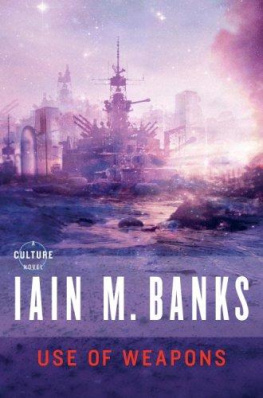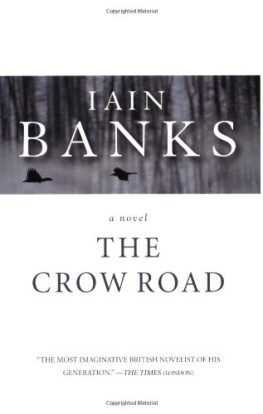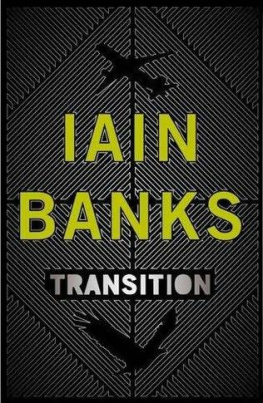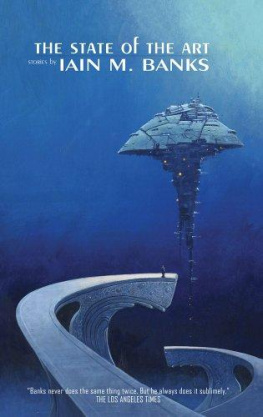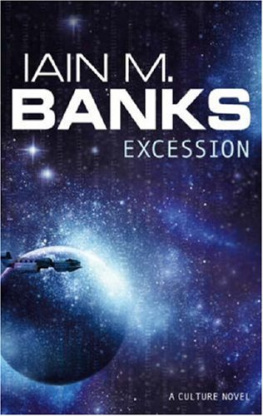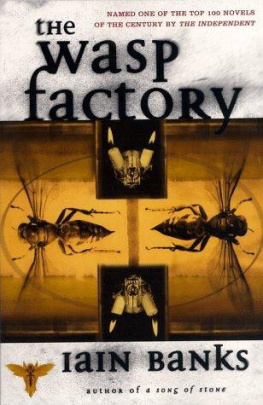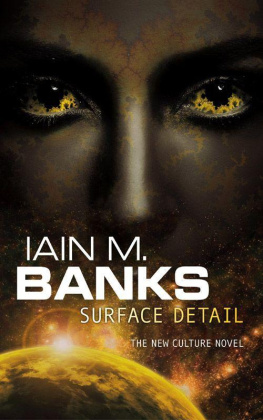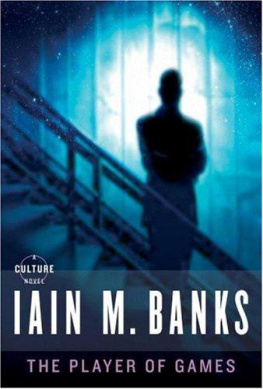Simone Caroti - The Culture Series of Iain M. Banks: A Critical Introduction
Here you can read online Simone Caroti - The Culture Series of Iain M. Banks: A Critical Introduction full text of the book (entire story) in english for free. Download pdf and epub, get meaning, cover and reviews about this ebook. year: 2018, publisher: McFarland, genre: Science. Description of the work, (preface) as well as reviews are available. Best literature library LitArk.com created for fans of good reading and offers a wide selection of genres:
Romance novel
Science fiction
Adventure
Detective
Science
History
Home and family
Prose
Art
Politics
Computer
Non-fiction
Religion
Business
Children
Humor
Choose a favorite category and find really read worthwhile books. Enjoy immersion in the world of imagination, feel the emotions of the characters or learn something new for yourself, make an fascinating discovery.
- Book:The Culture Series of Iain M. Banks: A Critical Introduction
- Author:
- Publisher:McFarland
- Genre:
- Year:2018
- Rating:5 / 5
- Favourites:Add to favourites
- Your mark:
- 100
- 1
- 2
- 3
- 4
- 5
The Culture Series of Iain M. Banks: A Critical Introduction: summary, description and annotation
We offer to read an annotation, description, summary or preface (depends on what the author of the book "The Culture Series of Iain M. Banks: A Critical Introduction" wrote himself). If you haven't found the necessary information about the book — write in the comments, we will try to find it.
Simone Caroti: author's other books
Who wrote The Culture Series of Iain M. Banks: A Critical Introduction? Find out the surname, the name of the author of the book and a list of all author's works by series.
The Culture Series of Iain M. Banks: A Critical Introduction — read online for free the complete book (whole text) full work
Below is the text of the book, divided by pages. System saving the place of the last page read, allows you to conveniently read the book "The Culture Series of Iain M. Banks: A Critical Introduction" online for free, without having to search again every time where you left off. Put a bookmark, and you can go to the page where you finished reading at any time.
Font size:
Interval:
Bookmark:

Also by SIMONE CAROTI
The Generation Starship in Science Fiction:
A Critical History, 19342001 (McFarland, 2011)
of Iain M. Banks

McFarland & Company, Inc., Publishers
Jefferson, North Carolina
LIBRARY OF CONGRESS CATALOGUING DATA ARE AVAILABLE
BRITISH LIBRARY CATALOGUING DATA ARE AVAILABLE
e-ISBN: 978-1-4766-2040-4
2015 Simone Caroti. All rights reserved
No part of this book may be reproduced or transmitted in any form or by any means, electronic or mechanical, including photocopying or recording, or by any information storage and retrieval system, without permission in writing from the publisher.
Front cover images of planets 2015 iStock/Thinkstock
McFarland & Company, Inc., Publishers
Box 611, Jefferson, North Carolina 28640
www.mcfarlandpub.com
To the memory of
Iain Menzies Banks
(19542013).
Thank you for everything, Sir.
As every utopia contains, if only as a nightmare to haunt the sleep of its happy citizens, the shadow of dystopia, so does every dystopia harbor, if only as a yearning in the waking minds of those trapped within the workings of its world-machine, the promise of a better place in a future brighter than the present. The early months of 1997, the year I discovered Iain Menzies Banks Culture series, were also the time in which I realized that utopia and dystopia belong to the heart of the individual as much as they do to the collective soul of a society. My mother was gone, taken by cancer, and my internal horizon had shrunk to the range of the day; when the sun pulled the curtain on the afternoon, I quietly reset my internal clock to zero, waiting for the next iteration. I didnt think beyond tomorrowmy future felt uncertain right thennor did I go back in my memory to a time before the day just gonemy past was full of a life spent with her, and that did not quite bear dwelling on.
In the normal course of events, I came to understand that I was going through the same process of grieving everyone else goes through when such things happen to them, but at that time, mired in the immediacy of the moment, all I knew was that I needed to find evidence that a future existed at some point along the line in which I could reboot and restart. So I started seeking this evidence, and because Im a bookworm, both by temperament and by training, I sought it in the voices others had committed to print. I read a lot, anything from Macbeth to Calvin and Hobbes (this pairing feels, to me, strangely appropriate), and because I was at least taking some form of action against my prevailing internal weather, things started improving.
Then came the summer of 1997. I went to Cambridge, England, for three weeks, and among the many books I brought back home to Trieste, Italy, was Excession (1996), whose paperback edition had just come out. To this day, my memories of reading that novel come back to me as an undifferentiated timespan, a succession of mornings and evenings disconnected from any sense that a calendar had anything to do with anything I was thinking or feeling. There it was, a future, drawn out in trajectories across hyperspace, told through the serene clear agency of godlike AI, and spelled out in a voice modulated so that the pain of ones existence became a small section of a far larger context. And there was a past, also contextualized so that I could now see it as part of a four-dimensional flow of which I, with all my angst, was only a microscopic subset. Excession contributed to ease the burden on my shoulders; it helped return my yesterdays and my tomorrows to me, all of them, so that The Commonwealth Of Simone Caroti could now begin to seek a life in, as Alasdair Gray once put it, the early days of a better nation. Excession also opened up the path to the other Culture novels: I backtracked to read the State of the Art, Consider Phlebas, The Player of Games, and Use of Weapons (in that order), and when I was done I waited patiently, along with everybody else, for the next installments. Absurdly, part of me still waits today.
By the end of 1997, budding and wildly under-read literary critic that I was, Id decided I would write a book about the Culture when the appropriate time came, and now, seventeen years and a bit more reading later, the moment has come. I made the original proposal to my publisher in December of 2012, when Banks was still with us, and I was fully determined to interview him. I was also going to go to WorldCon 2014 in London, where he was going to be Guest of Honor, and tell him everything I wrote above. I wanted him to know hed made a difference.
Instead, I found myself looking at the history of the Culture not as an ongoing project, but as a closed body of work, and I didnt go to London. I stayed home and wrote, which given the circumstances was for the bestmy love of Banks writing had started out as a personal affair, and it felt appropriate that I should write the book in the same spirit. That I really didnt have any other choice helped the decision along in no small measure.
This book is meant as an introduction to the Culture series, not as any sort of presumptive final word on it. Researching Banks and his work, even confining myself to the ten books comprising the Culture universe, I found so much to discuss that a book twice the length of this one still wouldnt have exhausted the topic. This gives me as much joy now as it frustrated me when the time came to decide what to put in and what to leave out. I bear full responsibility for the choices I made, although I do hope to have at least partly succeeded in illuminating my subject.
Many people helped make this book what it is and worked to let me know what I needed to do to improve it. As usual, if you find merit in the arguments that follow, thank them as well; if you dont, blame me for being fully forewarned and still botching the job.
Thanks to John Clute, who took time to speak with me in the very early stages of the books composition and make me understand exactly what Id set out to write and for whom I was writing. Johns voice also pervades this book through his reviews of the Culture novels and his writings on fantastika, all of which happily accompanied me on my way. I am deeply grateful for his help.
Thanks to the many participants to ICFA 35 in Orlando (March 2014) who graciously dedicated part of their time to discussing with me Banks impact on SF and his legacy. Ian McDonald, Russell Letson, Mary A. Turzillo, Geoffrey A. Landis, Suzy McKee Charnas, and James Morrow in particular were of significant help.
Thanks to Douglas Texter for proofreading everything I wrote and pointing out what I was doing well, but especially what I was doing wrong. He made this book far better than it would otherwise have been.
Thanks to my colleagues and my students in the Creative Writing for Entertainment BFA at Full Sail University, Winter Park, Florida. Throughout the many months of this works gestation, they enfolded me inside a community of discourse wherein my thoughts returned to me clarified, cleaned, and sharpened. Their voices echo through this work, again making it better than it would otherwise have been.
Thanks to Noelani Cornell and Christopher Ramsey, my program coordinators, who helped me get through the more intense months of this books composition.
Next pageFont size:
Interval:
Bookmark:
Similar books «The Culture Series of Iain M. Banks: A Critical Introduction»
Look at similar books to The Culture Series of Iain M. Banks: A Critical Introduction. We have selected literature similar in name and meaning in the hope of providing readers with more options to find new, interesting, not yet read works.
Discussion, reviews of the book The Culture Series of Iain M. Banks: A Critical Introduction and just readers' own opinions. Leave your comments, write what you think about the work, its meaning or the main characters. Specify what exactly you liked and what you didn't like, and why you think so.



